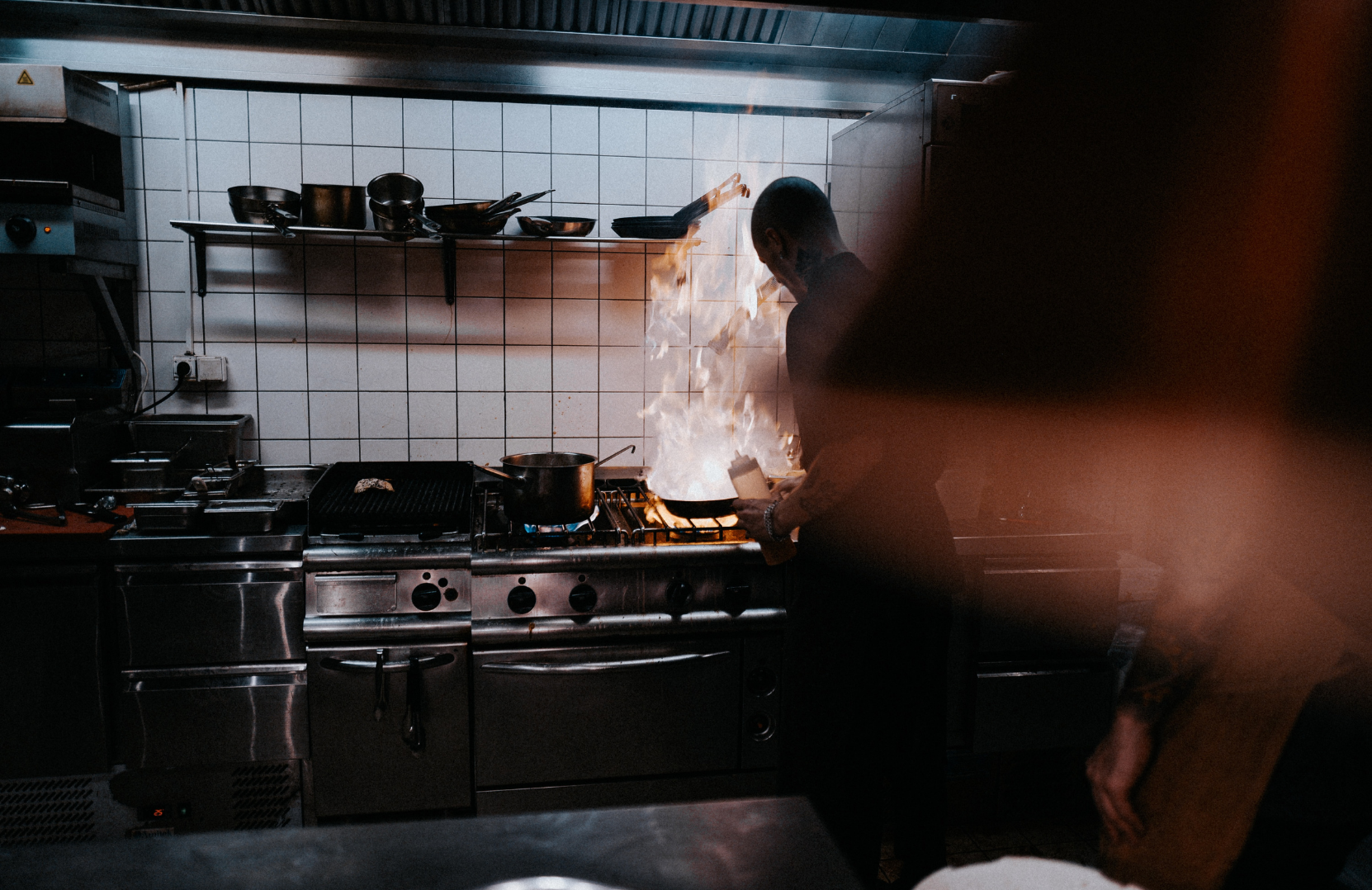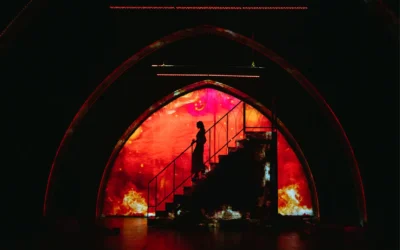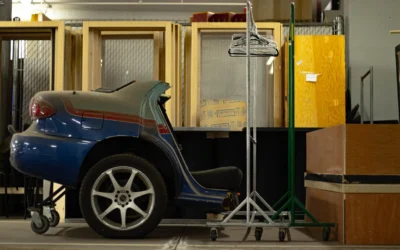When I walked into the food establishment aptly named “Ghost Kitchens,” located on 11729 Jasper Avenue, I was shocked to see nothing but a small store outfitted with basic food preparation and storage necessities. There was limited seating space, barely any chairs, and nothing more than a small table set up near the front window. Instead of looking like a traditional eatery, the store was filled with coolers, slushie machines, and a sizable kitchen near the back. In the centre of the store was a giant touchscreen menu that housed numerous brands like Cheesecake Factory Bakery, Taco Del Mar, Cinnabon, Slush Puppie, and Red Bull.
Ghost Kitchens is one of many stores popping up in Edmonton following a new restaurant trend: virtual kitchens. Ghost kitchens (also known as dark kitchens, cloud kitchens, or virtual kitchens, each of which has slight differences in their execution) are the new craze hitting the food industry. The term “ghost kitchen” was first coined in a 2015 NBC New York Article that investigated unregulated kitchens and bogus restaurants under false addresses. Now more safe and regulated, ghost kitchens refer to “commercial kitchens that exist only to fill orders from food delivery apps,” states a CBC article.
Kirk Kropf, a frequent user of food delivery apps such as SkipTheDishes and Uber Eats, says he uses these apps once every two weeks. Kropf says the biggest draw from these food delivery apps is the convenience and variety of food.
“I really like the service, the ability to order from higher-end restaurants and then eating at home… it just didn’t feel right or normal to order and pick up from a restaurant and bring it home,” says Kropf. “Now, it just kind of makes it more normal.”
“I think it’s a lot more convenient; it opens up a lot more options for trying new restaurants, especially with some of the reviews that people give. Sometimes you don’t even know these restaurants exist. Now, just the ease of the app shows you what’s in and around your area; you’re trying new stuff that you want.”
Like Ghost Kitchens on Jasper Avenue, the primary market of these kitchens is to attract people like Kropf: those who frequently use food delivery apps rather than go out for a traditional sit-down dining experience. According to a 2021 CTV article, “39 per cent of Canadians had tried a food delivery app at least once, up from 29 per cent in May 2019.” Moreover, as researched by the Agri-Food Analytics Lab at Dalhousie University and relayed by CTV, over 63 per cent of Canadians ordered food online in some capacity over the last six months of 2020.
When your only form of business comes from these delivery apps, downsizing and offering as many food options as possible make logical business sense. Abraham Durra, Ghost Kitchens’s area supervisor and manager of the Jasper Avenue location, believes the variety of brands is what gives Ghost Kitchens its success.
“You can get all these international brands in one delivery,” says Durra. “You can order Slush Puppie; you can get your Cinnabon; you can get cheesecake, Quiznos, Taco Del Mar…. We have food from each country… from every culture.”
According to Ghost Kitchens’s website, 22 official brands have signed up to partner with Ghost Kitchens; however, some brands are location-dependent and can’t be accessed at every Ghost Kitchens location. For instance, Ghost Kitchens carries local and pop-up brands, such as Wally’s Waffles, that may not be available in other locations around the country.
Therefore, not all brands are equally distributed across Edmonton. For example, according to Ghost Kitchens’s website, Durra’s Jasper Avenue location does not have the brand Saladworks, but the Whyte Avenue location does.
From Cheesecake Factory Bakery to Nathan’s Famous, most of the well-known brands from the United States that Ghost Kitchens carry either have limited stores in Canada or none at all. For example, there is only one Cheesecake Factory in Canada, located in Yorkdale Shopping Centre in North York, Ontario, according to The Cheesecake Factory’s website.
Because Ghost Kitchens offer as much variety as possible, Durra says he avoids the potential financial risk of going all-in on one brand.
“The beauty about this business is that, let’s say, Slush Puppie didn’t work for you, turn it off, open another menu so you’re not moving stores,” explains Durra. “But, if Subway didn’t work, you’re stuck with it.”
However, with all these different brands and cuisines essentially going through one kitchen, ensuring consistent quality could be difficult. As traditional kitchens are often created to cook one type of cuisine, having one kitchen do multiple is a tall order.
Durra says a lot of Ghost Kitchens’ food comes pre-packaged and pre-cooked, allowing for a quick turnaround for preparation and delivery.
“For example, Cinnabon is just packing. Cheesecake, Red Bull, ice cream… you just pack them and send them, it doesn’t take time,” explains Durra. “Some of them come halfway cooked, and they are frozen. We just deep fry it a little bit, and we send it so it won’t take the full time.”
Sharon Thach, a prominent Edmonton food blogger who runs the site Eat With Sharon, says the ease and efficiency that Durra describes is what stood out about her experience ordering from a ghost kitchen.
“It’s great for just picking up and going and enjoying the food… I thought it was really easy,” explains Thach. “(It) definitely helps speed things up a bit. It’s really convenient.”
Likewise, Kelsie Peter, a frequent user of food delivery apps, says her experience ordering cinnamon buns (Ghost Kitchens’s most popular item, according to Durra) from Ghost Kitchens’s Cinnabon menu met the quality she expected.
“The cinnamon buns were just as good as they would have been if I got them at the Cinnzeo at Southgate…. They were as good as any cinnamon bun would be,” says Peter.
Mackenzie Potter, a supervisor for the ghost kitchen brand Reef, located on 10044 105 Street, says Reef uses similar food preparation to Ghost Kitchens. However, unlike Ghost Kitchens, Reef runs their kitchen out of small trailers found in Impark parking lots in Edmonton. Reef has partnered up with celebrity brands such as DJ Khaled’s Another Wing, MrBeast Burger, and even Wendy’s.
“This (location) is an EK (execution kitchen) which is the vessel itself, and then we have a PK which is the production kitchen,” explains Potter. “Some of our burgers they make at the PK and then ship it to us daily. Then we serve and cook it on our flattop.”
According to Reef’s website, their kitchens are called “Neighborhood Kitchens” (or NBRHD kitchens) that promise zero cost or overhead to restaurant owners. As stated on Reef’s website, Reef “manages all of the staffing, site selection, and stock management on the restaurant owner’s behalf while maintaining the high quality and consistency standards of our partners.” Potter believes this concept sets Reef apart from ghost kitchens and other virtual restaurants.
“Mr. Beast doesn’t need to set up the whole restaurant, but it allows his brand to be available in different markets. It’s easier than getting a brick and mortar,” says Potter. “We run a burger brand called Vera’s, which is out of B.C., now it allows their brand to have a larger reach.”
However, as these ghost kitchens take on more brands and, ultimately, more customers, having enough space has become an issue for both Ghost Kitchens and Reef. Potter describes that his Reef kitchen produces over 130 orders a day, but the space is tight.
“It is a snug space. During the day, even at nighttime, there’s two or three of us…. Trying to move around, it is kind of compact,” explains Potter.
Durra claims he has the same issue with his Jasper Avenue location. He says that he cannot take on any more restaurants at his location due to the lack of space. According to Durra and Business Wire, Ghost Kitchens has recently partnered up with Walmart Canada to offer even more food options to Canadians in Ontario and Québec — a big get for Ghost Kitchens considering Walmart has traditionally partnered with McDonald’s.
“Every couple of months, we have two to three new brands to launch… unfortunately, I cannot add anything,” says Durra. “If I want to add, I have to take the next door and kick all these walls out.”
Though ghost kitchens have no doubt proven their convenience and technological innovation throughout the pandemic, one downside is their disconnected nature. Thach believes that this disconnect between customers and owners is a glaring issue for the overall customer experience.
“I know a lot of people who enjoy going out to eat do enjoy that experience of sitting down at a restaurant and being able to interact with the owners and the people that work at the business,” explains Thach. “I feel like more ghost kitchens popping up might take away from that experience.”
From the economic success of Ghost Kitchens, Reef, and other virtual kitchens, it is clear that ghost kitchens will likely have a permanent stake in the food industry outside the pandemic. Though it remains exactly how permanent this trend may be, Thach believes ghost kitchens deserve to be a part of the food industry and help bring more options to the Edmonton food scene.
“Ghost kitchens are definitely a great addition. There’s just so much room for growth and opportunity in the Edmonton food scene still, compared to some of the bigger cities,” says Thach.
“We continue to see a lot of really great additions to our foodie scene. There’s always new things to try… as long as people are willing to go out and support those businesses; I think it’s great.”





0 Comments